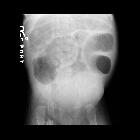slow transit constipation


School ager
with abdominal pain. AXR AP shows a marked amount of stool in the ascending colon that decreases somewhat in the transverse and descending colon but that massively distends the rectum to fill almost the entire pelvis.The diagnosis was constipation.

School ager
with progressive abdominal distension and abdominal pain over the last month and new onset urinary retention. Coronal (left) and sagittal (right) images from a CT with IV and oral contrast of the abdomen shows a hugely distended bladder whose dome nearly touches the inferior margin of the liver. There is a marked amount of stool throughout the colon, especially in the rectum where a fecaloma is pinching off the bladder neck and urethra.The diagnosis was constipation causing bladder outlet obstruction.


Severe
obstipation with all 24 markers accounted for in colon transit time examination. Radiography of the abdomen 5 days after ingestion of 24 radioopaque markers. Upper abdomen.

Severe
obstipation with all 24 markers accounted for in colon transit time examination. Radiography of the abdomen 5 days after ingestion of 24 radioopaque markers. Lower abdomen.

School ager
with recurrent abdominal pain. AXR shows a massive amount of stool from the cecum to the rectum.The diagnosis was constipation.

School ager
with abdominal distension and generalized abdominal pain. AXR shows a marked amount of stool from the cecum to the rectum.The diagnosis was constipation.

Infant with
increased bowel sounds and decreased stooling. AXR shows multiple extremely dilated loops of small bowel and no rectal gas.The diagnosis was distal small bowel obstruction due to constipation.

Koprostase
slow transit constipation
Siehe auch:
- Kolontransitzeitmessung (Hinton-Test)
- Pneumatosis intestinalis
- Dickdarmileus
- Ogilvie-Syndrom
- Koprolith
- röntgendichtes Material im Kolon
- Morbus Hirschsprung beim Erwachsenen
- Laxantionabusus
- obstruktive rektale Entleerungsstörung
- Kolitis bei impaktierter Fäzes
- Perforation bei Stuhlimpaktation
und weiter:

 Assoziationen und Differentialdiagnosen zu Koprostase:
Assoziationen und Differentialdiagnosen zu Koprostase:






